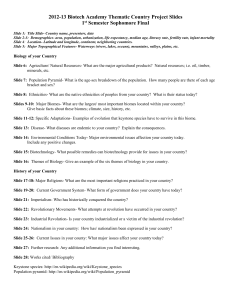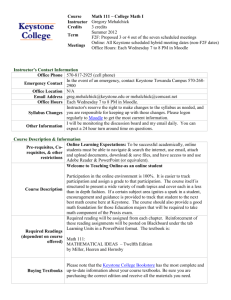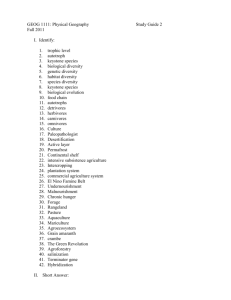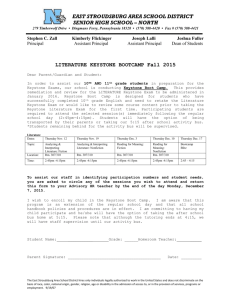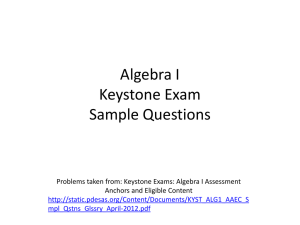Proposed Math 205 Syllabus
advertisement
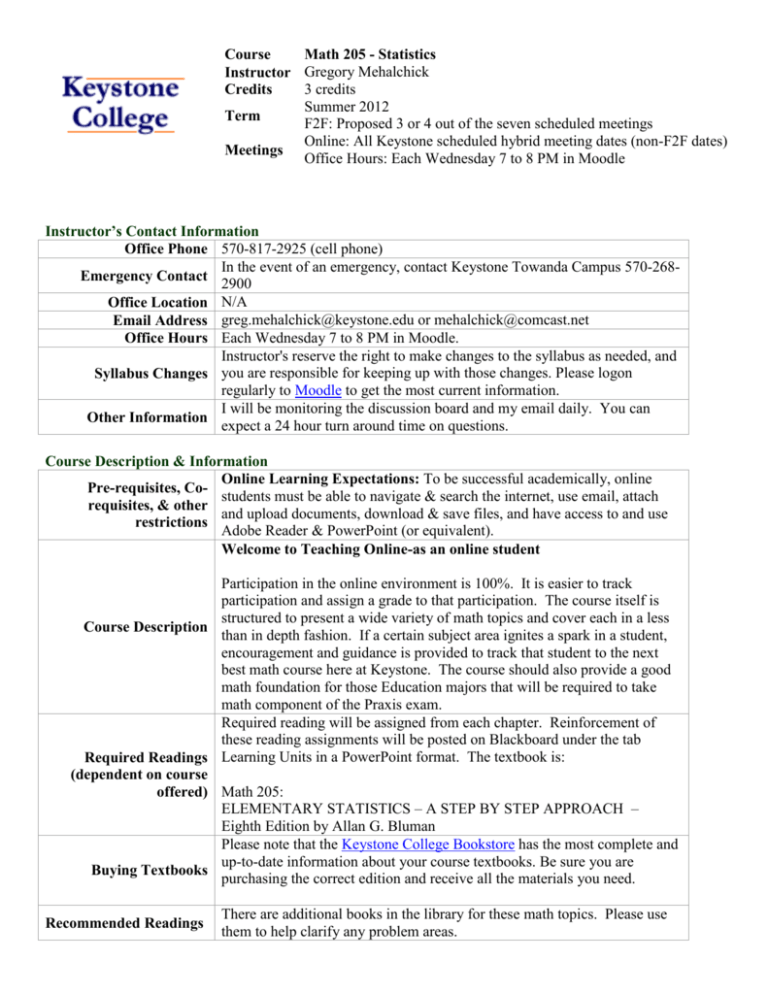
Course Math 205 - Statistics Instructor Gregory Mehalchick 3 credits Credits Summer 2012 Term F2F: Proposed 3 or 4 out of the seven scheduled meetings Online: All Keystone scheduled hybrid meeting dates (non-F2F dates) Meetings Office Hours: Each Wednesday 7 to 8 PM in Moodle Instructor’s Contact Information Office Phone 570-817-2925 (cell phone) In the event of an emergency, contact Keystone Towanda Campus 570-268Emergency Contact 2900 Office Location N/A Email Address greg.mehalchick@keystone.edu or mehalchick@comcast.net Office Hours Each Wednesday 7 to 8 PM in Moodle. Instructor's reserve the right to make changes to the syllabus as needed, and Syllabus Changes you are responsible for keeping up with those changes. Please logon regularly to Moodle to get the most current information. I will be monitoring the discussion board and my email daily. You can Other Information expect a 24 hour turn around time on questions. Course Description & Information Online Learning Expectations: To be successful academically, online Pre-requisites, Costudents must be able to navigate & search the internet, use email, attach requisites, & other and upload documents, download & save files, and have access to and use restrictions Adobe Reader & PowerPoint (or equivalent). Welcome to Teaching Online-as an online student Participation in the online environment is 100%. It is easier to track participation and assign a grade to that participation. The course itself is structured to present a wide variety of math topics and cover each in a less Course Description than in depth fashion. If a certain subject area ignites a spark in a student, encouragement and guidance is provided to track that student to the next best math course here at Keystone. The course should also provide a good math foundation for those Education majors that will be required to take math component of the Praxis exam. Required reading will be assigned from each chapter. Reinforcement of these reading assignments will be posted on Blackboard under the tab Required Readings Learning Units in a PowerPoint format. The textbook is: (dependent on course offered) Math 205: ELEMENTARY STATISTICS – A STEP BY STEP APPROACH – Eighth Edition by Allan G. Bluman Please note that the Keystone College Bookstore has the most complete and up-to-date information about your course textbooks. Be sure you are Buying Textbooks purchasing the correct edition and receive all the materials you need. Recommended Readings There are additional books in the library for these math topics. Please use them to help clarify any problem areas. Special Software/Hardware Browser/Plugin/Viewer Info Other Required Materials No special software or hardware is required. For standard Browser/Plugin/Viewer visit this page: http://web.keystone.edu/library/syllabus/browser.htm No additional materials are required. Course Objective/Outcome Math 205 - The course introduces each student to some basic statistical concepts in a step-by-step fashion. Concepts will include data descriptions, Course Objective counting techniques, probability, confidence intervals and hypothesis testing. Learning Outcomes (in all courses) Participants will be able to: Learning Outcomes 1. Identify or recognize the type of math problem or situation that is presented to them. 2. Solve the problem using the correct math process once the type of problem is identified. Assignments: All assignments will be announced in advance. Grading Grading Criteria Assignments Make-Up & Late Work Extra Credit Class Preparation & Participation This course has the normal Keystone grading structure: A, A-, B+, B, B-, C+, C, C-, D and F. Assignments will be provided throughout the semester. Late work will not be accepted. Make-up work will be negotiated provided the conditions that caused the situation are valid. No discussion board postings are accepted late. Extra credit problems or assignments will be announced throughout the semester. The student has the decision on whether or not to submit this work. Class participation is encouraged and will be taken into account when final grades are distributed. Course Policies Make-Up Exams Make up exams will be allowed only at the discretion of the instructor. Special Assignments None. Class attendance is not recorded. We meet a limited number of times and cover much material in each class. Therefore if a class is missed, the student Class Attendance may suffer the consequences of missing the on-line or face to face discussions and interactions. Student Conduct/ For Netiquette information, visit this webpage: Netiquette http://web.keystone.edu/library/syllabus/netiquette.htm On-line tests are not proctored for this course. All face to face tests will Special Procedures naturally be proctored. For Moodle assistance http://moodlerooms.keystone.edu/ or e-mail the Moodle administrator at https://chat.perceptis.com/c/keystone/ Moodle Support For a New Student Orientation to Moodle, visit: http://www.keystone.edu/educationaltechnology/tutorials.dot You can get technical support or assistance by visiting the Technology Technical Support Support page here: http://www.keystone.edu/technologysupport/index.dot or by contacting the IT Helpdesk at (570) 945-8778 or helpdesk@keystone.edu Academic misconduct and dishonesty includes any activity that compromises the academic integrity of the College or subverts the educational process. For information on dishonest acts including plagiarism, cheating, and fraud, Plagiarism & Academic consult your Student Information Guide or click on the link below. If you Integrity have any questions, talk with your instructor. http://web.keystone.edu/Library/syllabus/integrity.htm The copyright law of the United States (Title 17, United States Code) governs the making of photocopies or other reproductions of copyrighted materials, including music and software. Copying, displaying, reproducing, or distributing copyrighted works may infringe the copyright owner’s rights and such infringement is subject to appropriate disciplinary action as well as criminal penalties provided by federal law. Usage of such material is only Copyright Notice appropriate when that usage constitutes “fair use” under the Copyright Act. As a Keystone College student, you are required to follow the College’s copyright policy. For more information about the fair use exemption, see the Miller Library’s copyright page: http://web.keystone.edu/library/copyright.html Keystone College states that all official student email correspondence be sent only to a student’s Keystone email address and that faculty and staff consider email from students official only if it originates from a Keystone account. Email Use This allows the College to maintain a high degree of confidence in the identity of all individuals and the security of transmitted information. Keystone College furnishes each student with a free email account that is to be used in all communication with College personnel. The College has set deadlines for withdrawing from courses. These dates and times are published in the course catalog and on the Academic Calendar. It is the student's responsibility to handle withdrawal requirements from any class. Withdrawal from Class You must do the proper paperwork to ensure that you will not receive a final grade of "F" in a course if you choose not to attend once you are enrolled. If you are considering withdrawing from a class, talk with your Advisor and consult the College Catalog. Procedures for student grievances are found in the College Catalog. Please consult the procedures before taking action. Academic Grievance Please note: The first step in attempting to resolve any student grievance Procedures regarding grades, evaluations, or other fulfillments of academic responsibility, is to make a serious effort to resolve the matter with the instructor. The College Catalog outlines any subsequent steps. COURSE CALENDAR AND SCHEDULE OF ASSIGNMENTS MATH 205 - Statistics MODULE DATE AND TOPIC TOPICS TO BE COVERED Weekender Session I (Face to Face) Chapter 1: The Nature of Probability and Statistics Weekend 1 – Session 1 (3 hrs) Weekend 1 – Session 2 (3 hrs) 1.1 1.2 1.3 1.4 1.5 Descriptive and Inferential Statistics Variables and Types of Data Data Collections and Sampling Techniques Observational and Experimental Statistics Uses and Misuses of Statistics Chapter 2: Frequency Distributions and Graphs 2.1 Organizing Data 2.3 Histograms, Frequency Polygons and Ogives 2.4 Other Types of Graphs Weekender Session II (On-Line) Chapter 3: Data Descriptions 3.1 Measures of Central Tendency 3.2 Measures of Variation 3.3 Measures of Position On-Line Virtual Class (using Adobe Connect): Weekend 2 – Session 3 (3 hrs) Weekend 2 – Session 4 (3 hrs) Weekender Session III (Face to Face) First Announced Test: 1 hour Chapter 4: Probability and Counting Rules Weekend 3 – Session 5 (3 hrs) Weekend 3 – Session 6 (3 hrs) 4.1 4.2 4.3 4.4 4.5 Sample Spaces and Probability The Addition Rules for Probability The Multiplication Rules and Conditional Probability Counting Rules Probability and Counting Rules Chapter 5: Discrete Probability Distributions 5.1 Probability Distributions 5.2 Mean, Variance, Standard Deviation and Expectation 5.3 The Binomial Distribution Weekender Session IV (On-Line) On-Line Virtual Class (using Adobe Connect): Weekend 4 – Session 7 (3 hrs) Weekend 4 – Session 8 (3 hrs) Weekender Session V (Face to Face) Chapter 6: The Normal Distribution 6.1 6.2 6.3 6.4 Normal Distributions Applications of the Normal Distribution The Central Limit Theorem The Normal Approximation to the Standard Distribution Second Announced Test: 1 hour Chapter 7: Confidence Intervals and Sample Size Weekend 5 – Session 9 (3 hrs) Weekend 5 – Session 10 (3 hrs) Weekender Session VI (On-Line) On-Line Virtual Class (using Adobe Connect): Weekend 6 – Session 11 (3 hrs) Weekend 6 – Session 12 (3 hrs) Weekender Session VII (Face to Face) Weekend 7 – Session 13 (3 hrs) Weekend 7 – Session 14 (3 hrs) Finals Weekender 7.1 7.2 7.3 7.4 Confidence Confidence Confidence Confidence Intervals Intervals Intervals Intervals for the Mean when Is Known for the Mean when Is Unknown and Sample Size for Proportions for Variances and Standard Deviations Chapter 8: Hypothesis Testing 8.1 8.2 8.3 8.4 8.5 8.6 Steps in Hypothesis Testing – Traditional Method Z Test for a Mean t Test for a Mean z test for a Proportion X2 Test for a Variance or Standard Deviation Additional Topics Regarding Hypothesis Testing Third Announced Test: 1 hour Chapter 9: Testing the Difference Between Two Means, Two Variances and Two Proportions 9.1 Testing the Difference between 9.2 Testing the Difference between Samples: Using the t Test 9.3 Testing the Difference between 9.4 Testing the Difference between 9,5 Testing the Difference between Final Exam Two Means: Using the z Test Two Means of Independent Two Means: Dependent Samples Proportions Two Variances The final grade will be the average of the three hourly tests and the final exam. The final exam is equivalent to two hourly tests. The grade will be based on the following: Grade A AB+ B BC+ C CD F Average 90 to 100 87 to 89 84 to 86 80 to 83 77 to 79 74 to 76 70 to 73 67 to 69 60 to 66 less than 60
